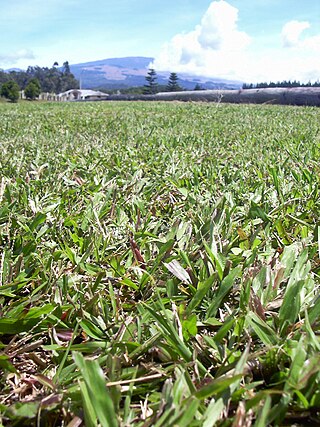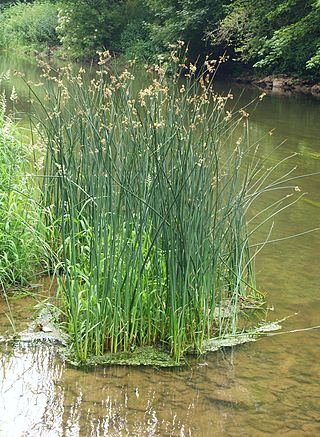
Paspalum is a genus of plants in the grass family.

Potamogeton is a genus of aquatic, mostly freshwater, plants of the family Potamogetonaceae. Most are known by the common name pondweed, although many unrelated plants may be called pondweed, such as Canadian pondweed. The genus name means "river neighbor", originating from the Greek potamos (river) and geiton (neighbor).

Camponotus compressus is a type of ground-nesting species of ant found in India and Southeast Asia. It is a frequent visitor to toilets as it consumes urea. It is one of the many species which tends plant-sap-sucking insects like aphids and tree hoppers. They add nutrients into the soil through their discarded waste piles These ants stroke their antenna on the hind parts of these insects stimulating them to excrete a sugar rich liquid, called honeydew, which the ants consume. In return, they are known to protect the insects from predators like ladybugs. These ants range from red to black and some times appear slightly yellow in colour.

Windsor Hill Marsh is a 0.84 hectare biological Site of Special Scientific Interest, north of the town of Shepton Mallet in Somerset, and adjacent to the Windsor Hill Quarry geological Site of Special Scientific Interest. It was notified in January 1972.

Axonopus compressus is a species of grass. It is often used as a permanent pasture, groundcover, and turf in moist, low fertility soils, particularly in shaded situations. It is generally too low-growing to be useful in cut-and-carry systems or for fodder conservation.

Ornithopus, the bird's-foot, is a genus of flowering plants in the legume family, Fabaceae. It includes six species and one natural hybrid native to Europe, Macaronesia, the eastern Mediterranean, northwest Africa, and Iran, and from southern Brazil to northeastern Argentina in South America.

Boxford Water Meadows is a 13.9-hectare (34-acre) biological Site of Special Scientific Interest in Boxford in Berkshire. It is part of the Kennet & Lambourn Floodplain Special Area of Conservation.
Ophiuros is a genus of Asia, Australian, and East African plants in the grass family.

Potamogeton compressus is a species of aquatic plant known by the common names grass-wrack pondweed, flatstem pondweed and eel-grass pondweed.

Centaurium pulchellum is a species of flowering plant in the gentian family known by the common name lesser centaury, or slender centaury. It differs from Centaurium erythraea by lacking basal rosette of leaves and by having a developed peduncle below the flowers. It is often much smaller, less than ten centimetres. It is native to the southern temperate parts of Europe.

Bushley Muzzard, Brimpsfield is a 1.13-hectare (2.8-acre) biological Site of Special Scientific Interest in Gloucestershire, notified in 1984.

Bulrush is a vernacular name for several large wetland grass-like plants

Potamogeton acutifolius is a European species of aquatic plant in the family Potamogetonaceae, known by the common name sharp-leaved pondweed. It is threatened and declining in at least part of its range.

Easton Farm Meadow is a 1.6-hectare (4.0-acre) biological Site of Special Scientific Interest in Easton, west of Boxford in Berkshire. It is in the North Wessex Downs.

Bulwick Meadows is a 4.2-hectare (10-acre) biological Site of Special Scientific Interest in Bulwick, north-east of Corby in Northamptonshire.

Cyperus compressus, commonly known as annual sedge, is a sedge of the family Cyperaceae that has a wide distribution throughout countries with warmer climates. It is found in tropical areas of Africa, Asia and the Americas.

Blysmus is a genus of sedges of the family Cyperaceae, found in temperate regions across the Northern Hemisphere.

Juncus compressus is a species of flowering plant in the rush family, Juncaceae. It is native to temperate Eurasia.Juncus compressus is easy to confuse with J. gerardii.

Blysmus rufus is a species of sedge belonging to the family Cyperaceae.


















